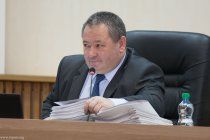 Русский
Русский English
English-







The Logical Continuation
They spoke about feasibility of ban on the import of "overage" cars to Pridnestrovie for the first time almost seven years ago. Amendments to the law "On Customs Tariff" were made in September 2008, which from 1 January 2011 was intended to become the legal obstacle on the way to the republic of foreign vehicles produced line more than 10 years ago. The mechanism for the transition to the new rules was proposed to be phasing. The first stage - was in 2009. The right to import vehicles whose age does not exceed 15 years from the date of their issue was granted during these 12 months. In the course of the next three-year (from 1 January 2010 to 31 December 2013th) cars not older than 14 years were allowed to be brought into the republic. Complicated economic situation, living standards decline have forced parliamentarians twice to initiate the extension of the transition period. If the first extension came into force, the law, involving the extension of the licensing standards by the end of 2015, adopted by the Supreme Council in December 2014, was not supported by the President. Parliamentarians, without changing their position, have overcome presidential veto, but the document was not signed. The consequences of the resulting legal gap were not long in coming. Citizens who did not complete customs clearance of imported cars by January 1, whose age passed 10 years (the number in the hundreds), were in an unenviable position.
Gregory Dyachenko focuses on two aspects. Firstly, there is demand for the ten-year and older foreign cars in Pridnestrovie; and it is wrong to deprive citizens of the republic of possibility to update their financial capabilities of the vehicle. Secondly, every imported into the territory of the state vehicle, regardless of its age and value boost the state treasury: the payment of import duties (for this category of machines comes to the amount of approximately thousand dollars) has not been canceled. According to available information of parliamentarians, the flow of cars imported to the republic considerably decreased. If hundreds of cars were imported quarterly last year, in the current – there are very few.
At that Viktor Guzun drew attention to the other side of the coin. Old cars in a few years of operation are converted into the trash, and the conditions for their utilization have not been established in the republic. It is necessary to balance the interests and find a compromise solution that would satisfy both the state and the citizens, said the deputy.
The deputies really appreciating the consequences of what the document "hanging in the air", February 11 appealed to the president to sign the law. As arguments are not only socio-economic but also legal aspects: The Constitution requires the President signing legislation in case of overcoming veto at least by 29 votes of deputies. It did not get off the ground, and today the question was raised again during the plenary session. The deputies decided to appeal to the Constitutional Court.
Deputies consider the appeal to the Constitutional Court as necessary measure not only in the context of a specific law, but for clear definition of legality of actions in similar situations in principle. The decision on the application was made today by the Supreme Council. With regard to future developments, it is not the time to put an end to the discussion of the admissibility of used cars import, according to deputies. In the course of the plenary session the deputies returned to proposal to solve the problem by increasing the customs duties on imports of ten-year vehicles and older. Tariff graduation will take into account the interests of all parties, the advocates of this way out of the situation suppose. Chairman of the Supreme Council gave the protocol instructions to responsible parliamentary committees to study the issue in this direction.





